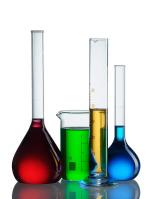|
This section contains 812 words (approx. 3 pages at 300 words per page) |

|
Chemistry deals with the study of the properties and reactions of atoms and molecules. In particular, chemistry deals with reaction processes and the energy transition. Major divisions of chemistry include inorganic chemistry, organic chemistry (chemistry of carbon based compounds), physical chemistry, analytical chemistry, and biochemistry. Geochemistry deals with the reaction unique to geological processes.
The origin of the modern science of chemistry is often attributed to the work of French physicist and chemist Antoine Lavoisier (1743–1794). In 1774, Lavoisier demonstrated that oxygen is a critical component of air needed for combustion. This observation led into a better understanding of the changes in composition and structure of matter. Lavoisier's publication of the first list of elemental substances eventually evolved into the Periodic table of the elements. Other important contributions to early chemistry include British chemist and physicist John Dalton's (1766–1844) atomic theory; Italian physicist and chemist Amedeo Avogadro's (1776–1856) theory that molecules are...
|
This section contains 812 words (approx. 3 pages at 300 words per page) |

|


